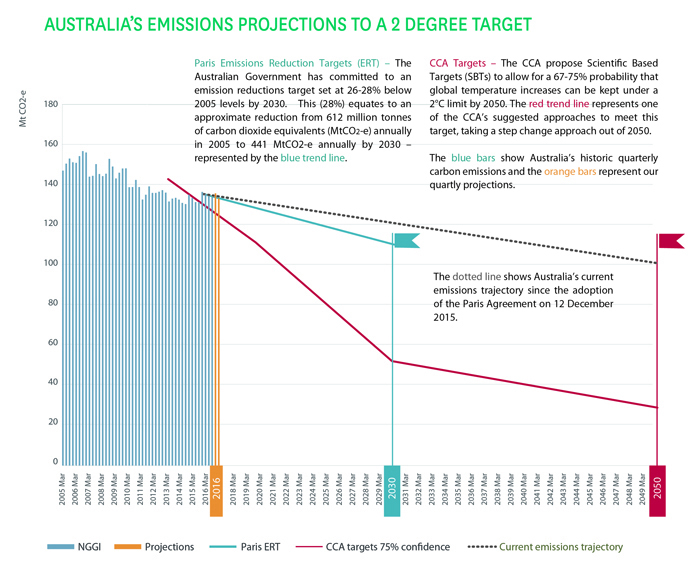Australia’s efforts to cut emissions are floundering and the government needs help.

Australia is slipping behind where it needs to be to be in line with the global ambition of a 2C warming limit, as determined by the Climate Change Authority. GRAPHIC by Ndevr Environmental
There’s plenty to talk about. Anzac Day talk is about life in the forces, but war in this century is also about terrorism and civil conflict. To add to the confusion we’ve invented new wars – on crime, drugs, diseases and the like – as a way of saying that we have a real battle on our hands.
The climate war is such a conflict. It is a war within and against ourselves, demanding new rules and paradigms. It will be the longest of all our long wars, and will have no decisive conclusion.
This war is being fought on many levels, from individual action all the way up to multi-national arrangements. It has no defined combatants, and the only clear boundary is our planet itself.
As is often the way with wars, the greatest impact of this one will be on young people, already under the hammer from various socio-economic pressures. When we make a decision about getting involved, their needs should be uppermost in our minds.
The best measure of success in this war is carbon dioxide emissions. In Australia, official data indicate some progress, with overall emissions down by over 15 per cent since 2005. But it’s worth unpacking that data. I’m using analysis by Melbourne-based carbon consultants Ndevr.
Science and other authorities say we need to cut emissions at an accelerating rate, but in Australia the reverse seems to be happening. All of that emissions decline happened before 2014. Since then our emissions have remained unchanged, or in some sectors even risen slightly.
Unpacking further, we find just one sector – forest management – that’s shown any marked decline, but most of that happened before 2011. There’s been little to show since, despite some big spending out of the Emissions Reduction Fund on projects to manage trees, land, soil and waste.
The drop in forestry emissions correlates not with ERF funding but with the 15-year decline in forest harvesting, which begs the question: Why do federal and state climate change ministers remain mute when others in their ranks seek to crank up the forest industry?
But forestry isn’t the main game in cutting emissions. It’s electricity generation, and its emissions have remained stubbornly high since 2013. It’s a similar story for stationary energy, land transport, waste, agriculture, fugitive emissions, industrial processes and product use.
Successive climate change ministers have repeated the mantra that we’re winning this war. Climate minister Josh Frydenberg took that optimistic position in the discussion paper for the long-awaited review of climate change policies. But the discussion paper itself gives the lie to that optimism.
It lists a collection of largely discrete programs: a revenue-funded scheme favouring agriculture and forestry over fossil fuels, a “safeguard mechanism” that penalises no-one, a renewable energy target with just three years to run, and peripheral support for innovation and efficiency.
We need coordinated, integrated programs targeting the big sources of carbon emissions – fossil-fuelled electricity, stationary energy and transport. Most economists say that the most cost-effective solution is to put a price on carbon through one of several possible mechanisms.
Malcolm Turnbull has said a lot about innovation, but there’s precious little sign of it in the way his government has addressed climate change. To me, the discussion paper is a well-disguised cry for help from a government that’s floundering and doesn’t know what to do.
We shouldn’t pass up the chance to help. This is a war we must win. We owe it to ourselves to make the effort, but also to those whose will be living later this century, when the perils of a changing climate will be all too real.
Anyone can put in a submission. It can be general or specific, long or brief. You are free to criticise, but you should also be positive and constructive. A call to arms would not be out of place.
We have until Friday week to submit our ideas. Search for “Australian climate change policy review” to find the discussion paper and instructions about making a submission.
